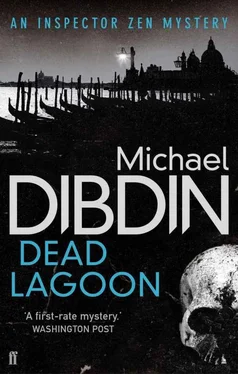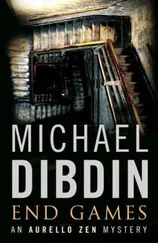Michael Dibdin - Dead Lagoon
Здесь есть возможность читать онлайн «Michael Dibdin - Dead Lagoon» весь текст электронной книги совершенно бесплатно (целиком полную версию без сокращений). В некоторых случаях можно слушать аудио, скачать через торрент в формате fb2 и присутствует краткое содержание. Жанр: Полицейский детектив, на английском языке. Описание произведения, (предисловие) а так же отзывы посетителей доступны на портале библиотеки ЛибКат.
- Название:Dead Lagoon
- Автор:
- Жанр:
- Год:неизвестен
- ISBN:нет данных
- Рейтинг книги:5 / 5. Голосов: 1
-
Избранное:Добавить в избранное
- Отзывы:
-
Ваша оценка:
- 100
- 1
- 2
- 3
- 4
- 5
Dead Lagoon: краткое содержание, описание и аннотация
Предлагаем к чтению аннотацию, описание, краткое содержание или предисловие (зависит от того, что написал сам автор книги «Dead Lagoon»). Если вы не нашли необходимую информацию о книге — напишите в комментариях, мы постараемся отыскать её.
Dead Lagoon — читать онлайн бесплатно полную книгу (весь текст) целиком
Ниже представлен текст книги, разбитый по страницам. Система сохранения места последней прочитанной страницы, позволяет с удобством читать онлайн бесплатно книгу «Dead Lagoon», без необходимости каждый раз заново искать на чём Вы остановились. Поставьте закладку, и сможете в любой момент перейти на страницу, на которой закончили чтение.
Интервал:
Закладка:
The first thing she notices is the chair, fallen forward across the dull marble pavement. It is of some wood as dark and heavy as pig-iron, elaborately carved, centuries old, grotesque. It has stood there in the hall all Ada’s life. She would gladly throw it in the canal, but that is impossible. Her duty is to preserve the family heritage intact. Besides, she couldn’t lift the thing. It has moved, though, seemingly of its own accord. There have been many such incidents lately, objects seemingly coming to life in her absence like a flock of birds and settling back in a slightly different configuration. She has tried in vain to make out any pattern or purpose to the phenomenon. It is the very triviality of the whole thing which makes it so disturbing.
The staircase leading to the first floor is a shadowy tunnel burrowing upwards into the innards of the huge building. Ada clicks the switch uselessly. The bulb must have gone, like so many in the house. There are no servants now, of course, so she must get by as best she can until Nanni and Vincenzo call. At least her nephews have stuck by her, despite their frequent differences of opinion. Not that they’re particularly warm or cordial, but at least they drive over from the mainland to see her every once in a while. That’s something these days, when the young are worse than Turks…
She pauses at the top of the staircase, in the long hallway running the length of the building. Amplified by the bare vaulted expanse of the andron below, the lapping of wavelets against the disused watersteps fills the air, as though someone were swimming in the canal. For a moment it seems to Ada that she can hear something else, a whispering or rustling, somewhere nearby. Mice, no doubt. She has given up trying to keep them down since her cat died, and hasn’t the heart to get another. There have been enough absences in her life as it is.
Leaving her bags on the landing, she opens the door into the first of the suite of rooms on the canal side of the building, the only one still in use. The great space is dark, the shutters tightly fastened. Surely she opened them before going out? Or was that yesterday? A noise behind her makes her start and look round, but it is only one of her plastic shopping bags subsiding. An apple tumbles over the collapsed rim and rolls away towards the edge of the top step. Just beyond, at the bottom of the long flight of stairs, its long bony arm upraised and pointing at her, stands a skeleton.
She runs inside the salon, slams the door shut and leans back against it, panting for breath. Which possibility is worse, that the skeleton is not real, or that it is? Nothing more happens. There is no sound. It is a very long time before she can force herself to open the door, eyes tightly closed. When she opens them, the portego, the landing, the stairs and the hallway below are all empty.
Ada retrieves the errant apple, picks up the bags and carries them through the lounge to the kitchen. There is just enough light seeping in through the shutters to see her way. In the distance she can hear the shouts of the men working on the Pagan house. She leaves the shopping on the kitchen table and returns to the salon, reaching for the light switch. There is a searing flash and the skeleton stands before her, inside the room now, its claw-like paw outstretched towards her, the skull hidously grinning.
A hand grasps her shoulder. She whirls round. Facing her, at waist level, is a child with long blonde hair and a smooth, round alabaster face of utter purity and stillness, the very image of Rosetta. Moaning, weeping, Ada blunders across the room, bumping heavily into the skeletal form, scrabbling at the telephone.
The long convoy of carriages eased to a halt at the platform and the whirring of the locomotive died away. The driver clambered down from his cab and headed for the canteen, passing the rows of darkened trains drawn up at the other platforms in readiness for the early morning departures, still several hours away.
For a moment it seemed as though the train which had just arrived was also empty. Then a door opened, halfway along. A man stepped down to the platform and stood sniffing the air. He was tall and rather gaunt, with a pale, grave face dominated by an angular nose. He wore a long overcoat and a homburg hat, from beneath which emerged tufts of dark hair streaked here and there with silver.
The line of sleeping cars jolted slightly as a locomotive was coupled to the other end, ready to pull the train back across the long bridge to the mainland to continue its journey to Trieste. Reaching up to the floor of the carriage, the man lifted down a battered leather suitcase, slammed the door shut and set off along the platform. The station was deserted, the cafe and newsagent’s closed. The man walked through the harsh glare of the foyer and out on to the broad steps where he paused again, scenting the air. Then, as though satisfied, he started down the steps and turned left.
At the foot of the Scalzi bridge two youths were unloading bundles of newspapers and magazines from a motorboat and stacking them beside a shuttered kiosk. The man spoke to them in dialect. One of the lads flourished a knife with which he slit open a pack of papers like gutting a fish. Money changed hands. The man turned away, scanning the headlines: MESTRE SMOG ALARM and GREEN LIGHT FOR THE LAGOON METRO.
He turned left again, off the broad thoroughfare and away from the shuttered shops, into an alley barely wide enough for him to carry the suitcase comfortably. His footsteps resounded like blows. A solitary cat fled at his approach, a half-eaten fish head hanging from its mouth. High in one wall, a single bleary window betrayed the presence of an insomniac or early riser. As the man passed under the lamp jutting out at first-floor level on its wrought-iron bracket, his shadow caught him up and sped ahead, looming ever larger across the rectangular paving stones. At the next corner he turned right, into another alley which gradually widened to form a wedge of open space with a rusty iron-capped well-head at its centre. Here, for the first time, his brisk steps faltered as the pavement went soggy beneath his feet, as though reverting to the marshy field it had once been. Memories crowded in on him like a gang of importunate child beggars.
The houses were built on three storeys: a ground-floor cellar with rectangular grilled openings, then the broad span of the main living area with its elegantly arched windows grouped in pairs, and finally the shallow square-windowed strip of bedrooms just below the roof. The uniformity of the facades was complicated by a horizontal and vertical grid of electric and phone cables, water and gas pipes, by metal strengthening bolts, exhaust vents, guttering, washing-lines, lamp standards and flowerpot holders. Some properties were smartly painted, ochre or russet, while elsewhere the plaster was flaking off like sunburned skin.
The man stopped in front of the most decrepit-looking house of all, facing the well. At ground level the plaster facing had virtually disappeared, revealing the pattern of red brickwork beneath. The shutters closing the first-floor windows were worn down to the bare wood, the scrolled and fluted stone sill was stained with brown streaks from the low metal railing. The doorframe was of the same white Istrian stone, with the number of the house stencilled on it in red paint in an oval frame. Beside the door was a bell-push shaped like an inverted breast. Above, a bowed strip of brass read ZEN.
The man took a key from his pocket and inserted it into the lock. The door creaked open. The passage inside was musty and cold. The light flickered yellowly to life, revealing a cramped vista of crumbling plaster, dull composite tiles, a set of stairs. Taking several rapid breaths, the man closed the door behind him and started up the steps. They twisted round to the left, doubling back on themselves to end at a small landing. A further flight continued up to the bedrooms. The man set down his suitcase and stood there gazing at the door, slightly ajar, in front of him. Then he abruptly pushed it open and barged in.
Читать дальшеИнтервал:
Закладка:
Похожие книги на «Dead Lagoon»
Представляем Вашему вниманию похожие книги на «Dead Lagoon» списком для выбора. Мы отобрали схожую по названию и смыслу литературу в надежде предоставить читателям больше вариантов отыскать новые, интересные, ещё непрочитанные произведения.
Обсуждение, отзывы о книге «Dead Lagoon» и просто собственные мнения читателей. Оставьте ваши комментарии, напишите, что Вы думаете о произведении, его смысле или главных героях. Укажите что конкретно понравилось, а что нет, и почему Вы так считаете.











